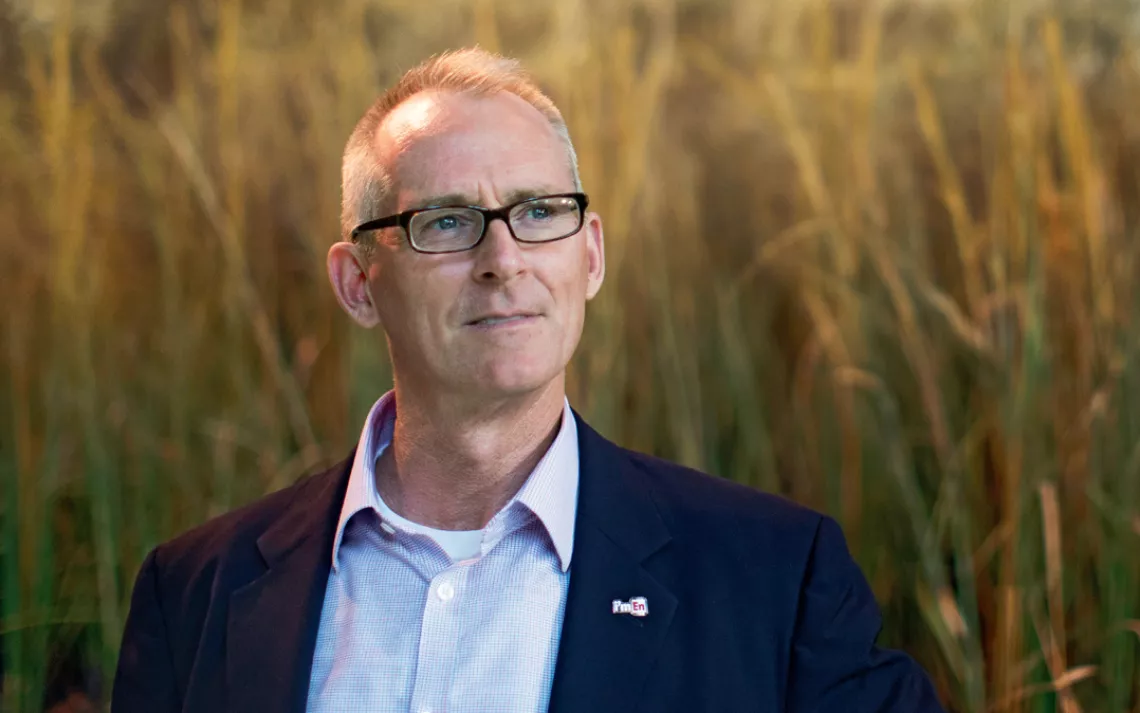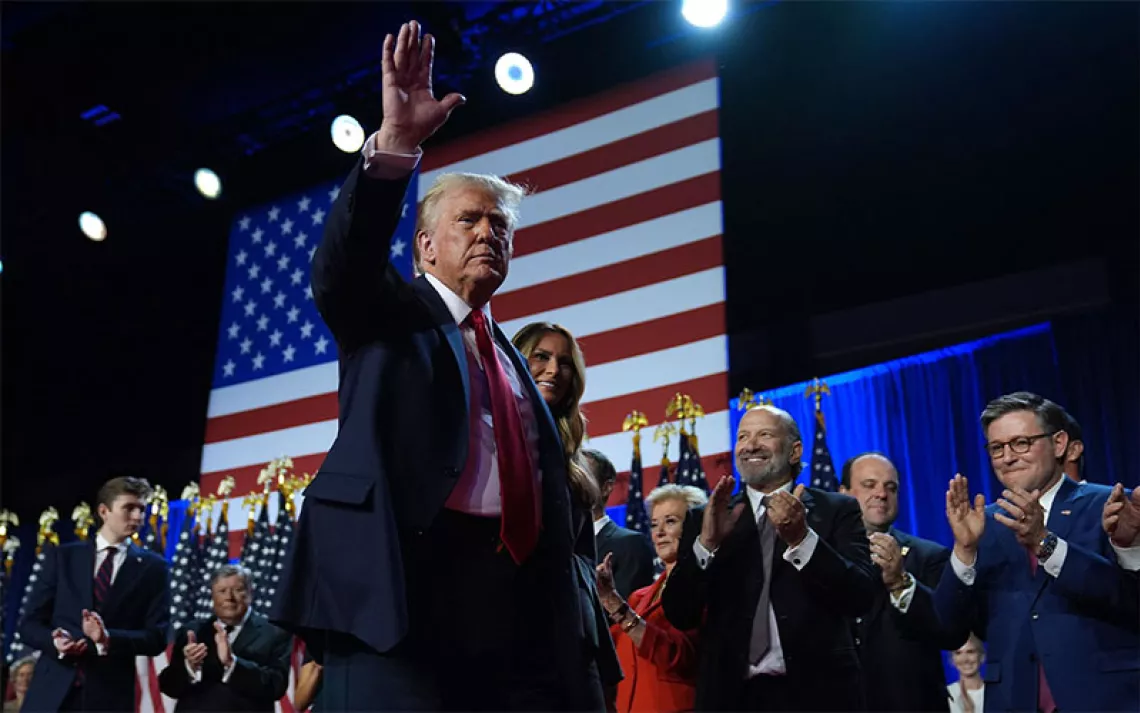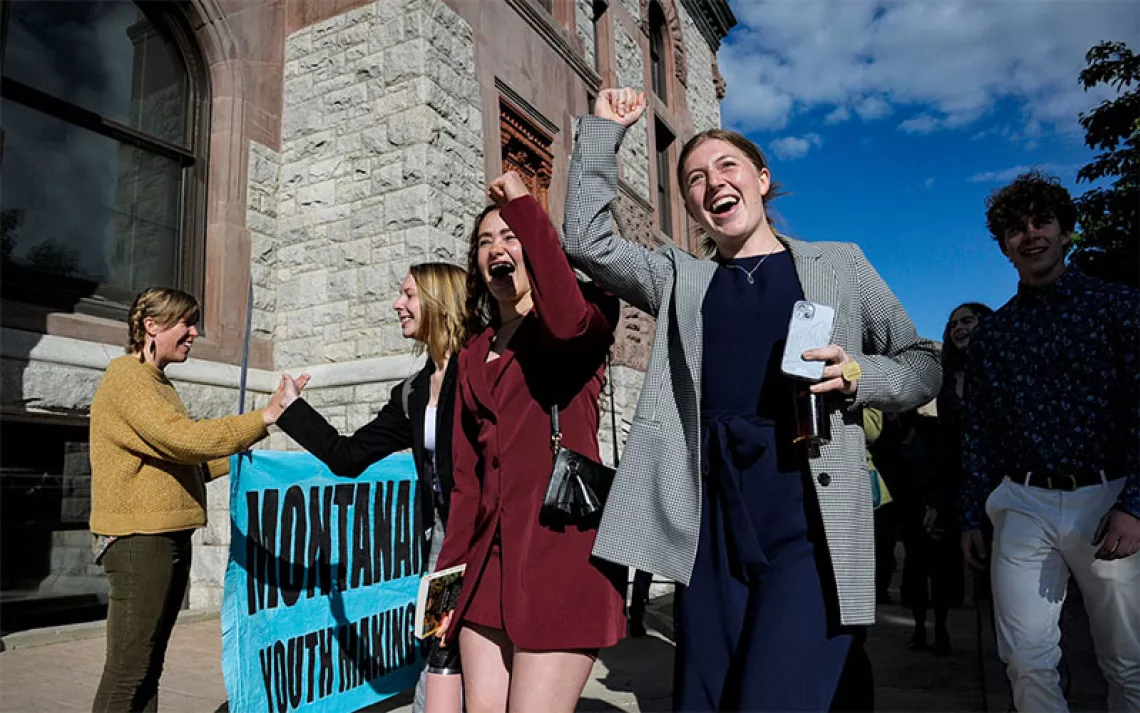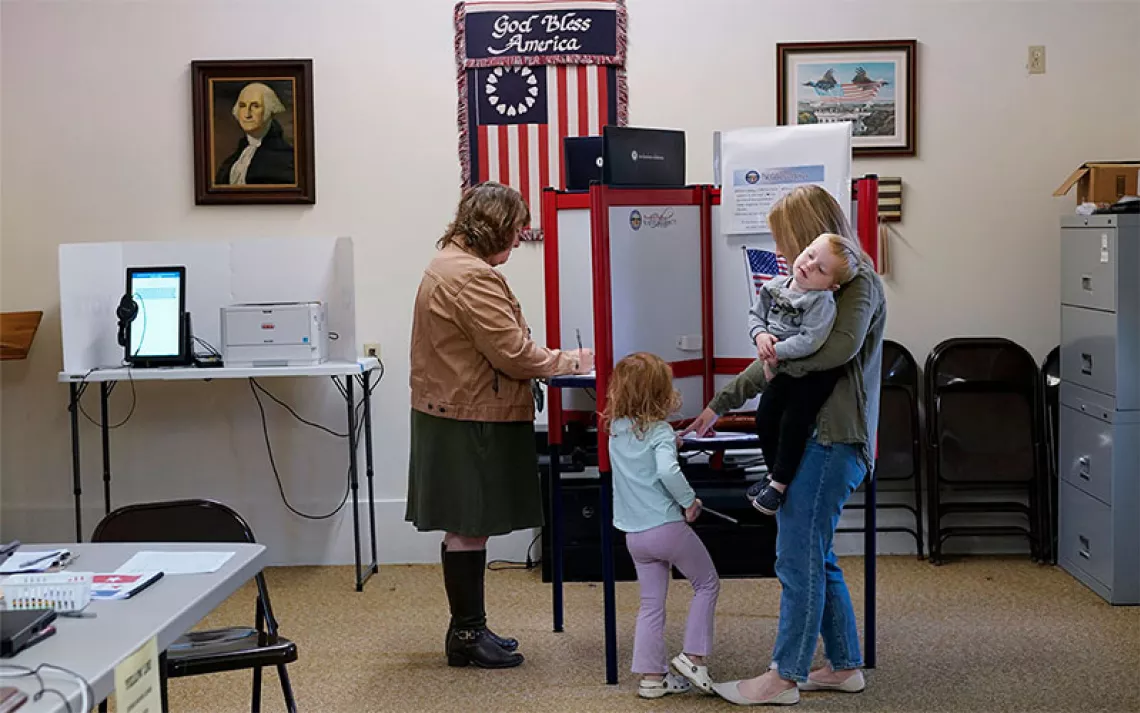Bob Inglis Takes a Stand on Climate Change
The former Republican Congressman has seen the light on global warming. He wants his fellow conservatives to see it, too.

Bob Inglis, former Republican congressman and current climate activist | Photo by Travis Dove
On a steamy June morning, a golf cart festooned with Boys State signs points the way to the auditorium at Catawba College in Salisbury, North Carolina. Inside, against a backdrop of red, white, and blue, a Republican apostate is pacing. There's a podium and a stage, but he avoids both, using a walking mic to get close to the crowd.
"Who loves North Carolina?" Bob Inglis cheerfully calls out, scanning an audience of several hundred high school seniors in search of a few to invite up.
The American Legion created Boys State in 1935 to counter "socialism-inspired Young Pioneer Camps," according to its website, and though one kid at this weeklong governmental leadership program has lilac-streaked hair, the cohort is largely straightlaced and right-leaning. That makes it perfect for Inglis, a former Republican congressman who is determined to transform the way conservatives think about one key issue.
He beckons a few boys to the front to say what they love about North Carolina—the mountains and beaches, the state's natural beauty—and then he pounces. "If I say 'clean energy,' what does that mean to you?"
They mention wind and solar, and Inglis launches into a short version of the stump speech for his new career and his dramatic defection from Republican climate change orthodoxy.
During Inglis's first six years representing Greenville-Spartanburg, South Carolina—"the reddest district in the reddest state in the nation"—he thought climate change was a bunch of hooey, Inglis tells the boys. That was 1993 to 1999, and Vice President Al Gore was pounding the table with a dark vision of environmental collapse. If Gore was for it, Inglis was against it.
He pauses and smiles, trim in black jeans and a checked suit coat. "I didn't know anything about it."
The room goes quiet.
For the next 30 minutes, Inglis describes his new view: not only that climate change is real and human-caused but also that free enterprise can address it better and faster than big government and regulations, that conservatives are poised to be the innovators, and that people who love God can be a powerful force in conserving His creation.
The boys ask savvy questions about Inglis's support of a revenue-neutral carbon tax and other issues, but it is clear that Inglis has reached them on a deeper level. One student bounds up to the standing mic and waits patiently in line to speak, shifting his feet a little. "Just so you can go home feeling good," he says, "when you talked about loving God and everything, you changed my views on climate change." The boys applaud. "I'm extremely conservative," he says, giving Inglis a serious nod, "but you have enlightened me."
Pay dirt. Energized, Inglis crosses the hall to hand out cards promoting his organization, RepublicEn.org. He takes an impromptu poll. "Raise that card if you think climate change is real." Nearly every card is raised. "Keep them up if you think it's human-caused." A few go down. "Now keep them up if you think free enterprise can fix it." Almost all remain up.
"Hold on—this is a great picture." He snaps a few shots for social media and urges the boys to upload selfies on RepublicEn.org's community page to "help us show members of Congress that you exist, that you have a greater claim on the future, that you want a solution." He steps forward and opens an arm wide, almost as if to begin a cheer. "Whether you are liberal or conservative," he says, with a sweep of the hand that takes them all in, "you want a solution."

At the North Carolina Museum of Natural Sciences in Raleigh, Bob Inglis speaks to a mixed crowd of conservatives and progressives. | Photo by Richard Shiro/AP Photo
As one of five siblings growing up in the 1960s in Bluffton, South Carolina, Inglis thought pollution was a necessary byproduct of earning a living. His dad, an industrial engineer, made paper at Union Camp Corporation in nearby Savannah, Georgia. His mom, a good company wife, made excuses about the ghastly stink from the plant. It smelled like bread and butter, she joked. It kept the family fed. The Inglises enjoyed time outdoors, but they never dwelled on the effects of the industry that supported the family. They were practical people.
Inglis went away to college at Duke University and then to the University of Virginia School of Law, but he was soon back, along with his wife, Mary Anne, to practice commercial real estate law in Savannah. The Union Camp paper mill still produced the familiar stench he remembered from his childhood—inevitable, he thought. But when Paul Schierl, the chairman of Fort Howard Corporation, a paper manufacturer that employed Inglis's firm, came to town to discuss a planned new recycling mill, Inglis encountered a different attitude.
They stepped out of a bank building in downtown Savannah and wham! The odor hit them. "How do they get away with that?" Schierl wanted to know. "No community in which we operate would let us do that to them."
Fort Howard went on to build a plant nearby that emitted no appreciable smell. Union Camp constructed a new plant near Eastover, South Carolina, that didn't smell either. Inglis realized that Union Camp could have cleaned up emissions at his dad's factory long ago. It was all a matter of expectations. As long as the Savannah area was willing to put up with the funk, the funk stayed.
The episode planted the seeds of doubt about the go-along-get-along beliefs with which he'd been raised. Inglis joined a firm in Greenville, South Carolina, and in the 1990s moved with his family to Whiskey Creek Farm near Travelers Rest, where his five kids could view the southern ridge of Duffs Mountain from the pasture. The oldest, Rob, planned and led the family's backpacking trips, lining his bedroom wall with packs ready to be filled a week ahead of time.
So it's not surprising that Rob would also take the lead in nudging Inglis out of his "hooey" period. After six years in the House of Representatives, in 1998 Inglis ran for Senate and lost. He returned to practicing law, then in 2003 decided to vie for his old House seat. This time, Rob was 18, old enough to weigh in: "Dad, I'll vote for you, but you're going to clean up your act on the environment."
All four of Rob's sisters agreed. So did Mary Anne.
Suddenly, Inglis had a new and rebellious constituency—one, he jokes, that could change the locks on the doors. While Rob's loving prompt was meaningful to him, however, Inglis didn't mention climate change during his successful 2004 campaign, talking about "energy security" instead.
The next nudge came during a trip to Antarctica in 2006 as a member of the House Committee on Science, Space, and Technology. Scientists at McMurdo Station had drilled deep into the ice in search of a record of Earth's atmosphere; the data revealed not only an uptick in CO2 levels coinciding with the Industrial Revolution but also much more instability and atmospheric damage in modern times. There was the evidence, right in the ice, as legible as a language if you knew how to read it.
Inglis sounds like one of those patient McMurdo scientists himself as we sit on a bench after his Boys State talk and he unwraps what he learned on his trip to Antarctica. "If I go deep into the earth and pull up . . . plants and animals that have been gone eons, and with time and temperature and pressure have turned into fossil fuels"—he glances at me to make sure I'm following—"and I bring those up to the surface and burn them, I change the chemistry of the air. . . . None of that is controversial science."
On another congressional trip, Inglis and colleagues stopped at the Great Barrier Reef and snorkeled with Australian climate scientist Scott Heron. Among the vivid fish and vibrant coral branching like fingers, Inglis realized that Heron was worshiping God as he interacted with nature. "Scott would show me something, come to the surface, and shout, 'This is amazing!'" Over lunch, they fell into conversation about their Christian faith. Inglis realized that as a religious scientist who recognized the threat of climate change, Heron had built a bridge that Inglis and fellow conservatives might one day be able to cross.
Inglis came home fired up. Along with Art Laffer, a former economic adviser to President Ronald Reagan, he cowrote an op-ed in the New York Times proposing a policy swap: Impose a carbon tax and reduce income or payroll taxes by an equal amount. Then he introduced the Raise Wages, Cut Carbon Act of 2009. It didn't go anywhere.
By then the Great Recession had hit. Fourth Congressional District voters who might once have been open to renewable alternatives to Middle Eastern oil—and the whole concept of energy security—weren't so interested anymore.
The Tea Party recruited a challenger to take on Inglis in the 2010 race. And while Inglis's support for immigration reform and his vote against the troop surge in Iraq may have made him suspect, climate change was probably his undoing. At some town hall meetings, people booed when he tried to talk. In the end, challenger Trey Gowdy wiped him out in a runoff, 71 to 29 percent.

Bob Inglis campaigned in South Carolina during his 2010 reelection bid. He lost to a Tea Party challenger, who beat him 71 to 29 percent. | Photo by Travis Dove
Inglis is a proud conservative, fond of rattling off his stats: a 93 percent approval rating from the American Conservative Union, 100 percent from both the Christian Coalition of America and the National Right to Life, an A from the NRA. But there's been no turning back for him on climate change.
After his electoral pummeling in 2010, he spent time as a fellow at Harvard's Institute of Politics and at Duke University, and he got financial support to hire a few people and form a team. In 2012, he founded the nonprofit Energy and Enterprise Initiative, based at George Mason University and known for its catchy branding as RepublicEn.org. A staff of eight is spread out in four states and Washington, D.C. Inglis says one staffer is in Wisconsin, Speaker of the House Paul Ryan's territory, "because I know Paul Ryan knows this [taking action to stop climate change] is the right policy."
Among RepublicEn's core tenets: Eliminate all fuel subsidies. Price fuels so the complete costs are incorporated. If "Inglis Industries" gets to spew its soot skyward, Inglis likes to say, the company should pay a tax per ton on the carbon produced. With such costs factored in, more people and companies will choose competing technologies, and the price of solar and other renewables will decline in relation to that of coal-fired electricity.
It's an idea that Al Gore has supported for a long time, but Inglis thinks Republicans will own it once they understand that it levels the playing field and encourages competition. To level that field worldwide, Inglis also calls for a carbon tax on imported products, assessing them based on the pollution involved in their creation (compared with the emissions from the production of similar American-made goods). Chinese businesses would get motivated not to pollute, and other countries would follow suit.
Not all environmentalists agree. While the Sierra Club favors putting a price on carbon, it has concerns that a carbon tax could be regressive and fall most heavily on poorer citizens. The Club also prefers tax credits and incentives for wind and solar development, partly in the belief that legislators aren't inclined to make the playing field truly level or eliminate the hidden subsidies for the fossil fuel and nuclear energy industries—such as below-market coal and oil leases and exemptions from federal pollution standards for fracking.
No matter the nuances of specific proposals, though, Inglis says change in climate policy will come down to one reality: Conservatives have to lead. Progressives alone simply don't have the votes to push climate policy through Congress.
But that's a tough sell. Only 47 percent of conservative Republicans believe global warming is real, according to a study this year from Yale and George Mason Universities. Just 26 percent acknowledge that global warming is caused mostly by humans. And only 21 percent are worried about it.
Those figures represent progress. In 2014, 28 percent of conservatives believed that global warming was real. Read that way, Inglis's team is up a whopping 19 percent in only two years.
Bob Inglis is an incorrigible optimist. He would have to be, given what he deals with every day. His ideal trip starts with a speech or panel discussion somewhere—maybe at a university—followed by a meeting with the college Republican and Libertarian clubs. Next, he'll do an interview on the city's talk radio station—whichever one carries Rush Limbaugh. Then he'll chat with the local newspaper's editorial board and have a one-on-one with the Republican member of Congress.
In other words, he spends a lot of time among climate change skeptics and deniers. He takes some hits—such as the occasional letter writer calling him a traitor. But he is confident that he's changing minds, one stop at a time. When he travels, he hands out cards that say, "Do you believe free enterprise can solve climate change? Dare to be heard @ RepublicEn.org." And he runs Facebook ads assuring other conservatives that if they care about climate change, they aren't alone.
As a 501(c)(3) nonprofit, Inglis's group can't lobby for specific legislation or encourage voters to choose a certain candidate. But his team can educate the public and elected officials about free-enterprise solutions to climate change and the potential for job creation. They can introduce the subject, take the initial arrows, get people thinking, and provide an entree for lawmakers to continue the discussion in their district or state. Inglis can help legislators come out of the closet on climate change.
Because some are in there. Inglis met one House member for coffee early this year at the Capitol Hill Club—a congressman who, on the House floor, is a "coal today, coal tomorrow, coal forever!" sort. It's over, the member told Inglis. Coal is done. We just need to figure out how to ease it down. "I couldn't believe the words were coming out of his mouth," Inglis says.
Now Inglis is trying to arrange events in the districts of several conservative members of Congress to help them broach the topic with constituents. He envisions a panel that he would moderate. In a calm, upbeat voice, Inglis demonstrates how it might sound to propose a future without coal. "Let's see if we can work this out. Let's do a little vision-casting about what this would look like. How can we care for people in your state involved in coal?" He'll tell them that he gets it—his own childhood was secure thanks to wages from a smelly paper plant. Legislators generally follow rather than lead, Inglis has found, but they can lead when they feel support.
A naturally skillful speaker, Inglis has worked with communication experts to refine his themes. Among his guiding principles: People respond best to language in keeping with their values. Conservatives believe in individualism and respect hierarchies. Progressives favor egalitarianism and act through community. "If you're talking to conservatives and you lay some communal, egalitarian language on them, it's unrecognizable to the tribe," he emphasizes. An example: Let's all come together under the auspices of the United Nations or the Intergovernmental Panel on Climate Change. "You can't imagine a worse entry into a conservative congregation than that."
From Inglis's point of view, the tone of the environmental left doesn't help. Conservatives don't trust people who shame their audiences or write like their hair is on fire. So Inglis doesn't yell. He'll tell people he disagrees with them strongly, but his tone is unfailingly hopeful. What happens when he's miffed? "He looks exactly like himself," says former staffer Catrina Rorke, "except he leans forward instead of backward."
Bob Inglis's colleagues appreciate his courage and his role as point man. Immigration, the economy, public health, national security—all the Republican flash points relate to climate change, says Katharine Hayhoe, a climate scientist at Texas Tech University who is an adviser to RepublicEn.org and an outspoken Christian. "If you care about this host of things . . . then you have to care about climate change, because it's affecting all those things, for good or for bad. Bob realized that." They aren't alone in their admiration: Last year, the John F. Kennedy Library Foundation gave Inglis the Profile in Courage award.
When Inglis feels discouraged, he watches Kennedy's 1962 "moon shot" speech at Rice University, which he calls 17 minutes of "pure American exceptionalism and belief in the people." Though Kennedy admits in the speech that certain materials for space flight haven't yet been invented, he says that, no matter what, the United States is going to do it.
Inglis wants to stir conservatives to tackle climate change with the same kind of can-do spirit that took astronauts to the moon. I see him look worried only once: when I ask if he ever fears that by the time the nation is ready to act, it will be too late.
We see each other again a few weeks after the Boys State event, at the North Carolina Museum of Natural Sciences in Raleigh. Greg Fishel, a TV meteorologist who in 2010 publicly switched from denying climate change to accepting the science, has invited Inglis to be part of the evening's panel discussion. Keep in mind, this is North Carolina: a swing state that Barack Obama won in 2008 and lost in 2012 by slim margins, a place where lawmakers once heard a report that the sea level could rise by as much as 39 inches within a century and responded by banning laws that take that prediction into account.
The crowd at the museum, though, demonstrates its belief in human-made climate change with a show of hands. Inglis takes the opportunity to hold up a "conservative mirror" so that progressives in the audience will understand how conservatives see them: They are grim prophets of an apocalyptic future in which everyone will walk instead of drive, eat bugs, do with less, and follow a godless new religion of climate change. The progressive message could use some tweaking. It's a matter of changing the vocabulary and incorporating a greater emphasis on free enterprise. He offers one other tip: Find a conservative friend to persuade, because progressives alone have gone as far as they can.
To the smattering of Reagan conservatives in the audience, Inglis brings a different message: You don't need to shrink into science denial. You can solve this. Embracing the science of climate change can lead to more energy, more mobility, more freedom.
When the panel adjourns, conservatives and progressives alike approach Inglis as he stands outside the museum theater near a stuffed great horned owl and a blue marlin skeleton, part of the Natural Treasures of North Carolina exhibit. "I'm a progressive," one woman tells him, "but I don't want to eat bugs." They both smile.
By 2022, Inglis anticipates, a carbon tax will have the support of 25 Republican members in the House and 15 in the Senate. That will be considerable progress, maybe enough to pass the tax. Assuming that many of the same conservative players are still in office, they'll have made an about-face, something of which Inglis has intimate knowledge.
When we first met, I asked Inglis how it felt to publicly admit he had been wrong about climate change. Was it embarrassing or painful?
"Not if you have a fulsome notion of grace," he replied. "If you understand grace, it's really possible to be corrected."
Grace has brought Bob Inglis here. Faith will see him through.
 The Magazine of The Sierra Club
The Magazine of The Sierra Club



